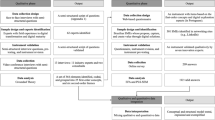Abstract
This paper uses Collingwood's methodology to attempt to understand those formative influences influencing Drucker within the Weimar Republic. It is intent on using this methodology to advance an historical thesis about both the origins and sources of Drucker's thought. By illuminating these formative influences on Drucker, the paper hopes to portray the implications of such influences for his theory of business management.
Similar content being viewed by others
References
Allen, R. L.: 1991, Opening Doors: the Life and Work of Joseph Schumpeter (Transaction Books).
Barkai, A.: 1989, From Boycott to Annihilation (University Press of New England).
Beatty, J.: 1998, The World According to Drucker (Orion).
Berger, P. L.: 1986, The Capitalist Revolution (Basic Books).
Bonaparte, T. H. and J. E. Flaherty (eds.): 1970, Peter Drucker-Contributions to Business Enterprise (New York University Press).
Borg, W. R. and M. D. Gall: 1989, Educational Research (Longman) in Advanced Research Methods: Book of Readings compiled by Dr. P. Green.
Bowie, N. E.: 1991, 'Business Ethics as a Discipline: The Search for Legitimacy', in R. E. Freeman (ed.), Business Ethics (Oxford University Press).
Campbell, J.: 1989, Joy in Work, German Work-The National Debate, 1800-1945 (Princeton University Press).
Collingwood, R. G.: 1994, The Idea of History (Oxford University Press).
Donaldson, T.: 1989, 'Moral Minimums for Multinationals', Ethics and International Affairs.
Dray, W. H.: 1964, Philosophy of History (Prentice-Hall, Englewood Cliffs, NJ).
Drucker, P. F.: 1933, Friedrich J. Stahl; Conservative Philosophy and Historical Continuity (Mohr).
Drucker, P. F.: 1939, The End of Economic Man (Heinemann).
Drucker, P. F.: 1941, 'What Became of the Prussian Army', Virginia Quarterly Review (January).
Drucker, P. F.: 1942, The Future of Industrial Man (Transaction Books).
Drucker, P. F.: 1955, The Practice of Management (Heineman).
Drucker, P. F.: 1958, 'Business Objectives and Survival Needs', Journal of Business (April).
Drucker, P. F.: 1971, Men, Ideas and Politics (Harper and Row).
Drucker, P. F.: 1973, Management: Tasks, Responsibilities, Practices (Harper and Row).
Drucker, P. F.: 1978, Adventures of a Bystander (Harper and Row).
Drucker, P. F.: 1982, The Changing World of the Executive (Time Books).
Drucker, P. F.: 1986, The Frontier of Management (Heinemann).
Drucker, P. F.: 1993, Post-Capitalist Society (Harper).
Drucker, P. F.: 1996, Interview in Wired Magazine (August).
Drucker, P. F.: 1998, Adventures of a Bystander (Wiley).
Evan, W. M. and R. E. Freeman: 1988, 'A Stakeholder Theory of the Modern Corporation: Kantian Capitalism', in T. Beauchamp andN. Bowie (eds.), Ethical Theory and Business (Prentice Hall).
French, P. A.: 1979, 'The Corporation as a Moral Person', American Philosophical Quarterly (3).
Freyberg, B.: 1970, 'The Genesis of Drucker's Thoughts', in T. H. Bonaparte andJ. E. Flaherty (eds.), Peter Drucker: Contribution to Business Enterprise (New York University Press).
Friedman, M.: 1970, 'The Social Responsibility of Business Is to Increase Its Profits', New York Times Magazine (September 13).
Fukuyama, F.: 1989, 'The End of History?', The National Interest 16, 3-18.
Fukuyama, F.: 1992, The End of History and the Last Man (Avon Books, New York).
Fukuyama, F.: 1995, Trust, The Social Virtues and the Creation of Prosperity (Hamish Hamilton).
Goodpaster, K. E.: 1991, 'Ethical Imperatives and Corporate Leadership', in R. E. Freeman (ed.), Business Ethics (Oxford University Press).
Gottfried, P.: 1990, Thinkers of our Time: Carl Schmitt (Claridge Press).
Green, R. M.: 1994, 'A Response to Richard T. De George's “Business as a Humanity: A Contradiction in Terms?”', in T. J. Donaldson and R. E. Freeman (eds.), Business as a Humanity (Oxford University Press).
Hayek, F. A.: 1960, 'The Corporation in a Democratic Society: In Whose Interest Ought It and Will It Be Run?', in M. Anshen andG. L. Bach (eds.), Management and Corporation (McGraw-Hill).
Heilbroner, R. L.: 1992, The Worldly Philosophers (Touchstone).
Hosmer, L. T.: 1996, '5 Years, 20 Issues, 141 Articles, and What?', Business Ethics Quarterly 6(3).
Klein, S.: 1998, 'Don Quixote and the Problem of Idealism and Realism in Business Ethics', Business Ethics Quarterly 8(1).
Levitt, T.: 1970, 'The Living Legacy of Peter Drucker', in T. H. Bonaparte andJ. E. Flaherty (eds.), Peter Drucker: Contribution to Business Enterprise (New York University Press).
Levitt, T.: 1958, 'The Dangers of Social Responsibility', Harvard Business Review (September-October).
Maitland, I.: 1994, 'The Morality of the Corporation: An Empirical or Normative Disagreement', Business Ethics Quarterly 4(4).
Mayer, R.: 1991, 'Hannah Arendt, National Socialism and the Project of Foundation', Review of Politics 53, 469-487.
McCoy, B. H.: 1983, 'The Parable of the Sadhu', Harvard Business Review (September-October).
Nisbet, R.: 1986, Conservatism: Dream and Reality (University of Minnesota Press).
Semmel, B.: 1992, 'Schumpeter's Curious Politics', The Public Interest 106.
Sen, A.: 1997, 'Economics, Business Principles and Moral Sentiments', Business Ethics Quarterly 7(3).
Sluga, H.: 1989, 'Metadiscourse: German Philosophy and National Socialism', Social Research 56(4), 795-818.
Taylor, A. J. P.: 1967, Europe: Grandeur and Decline (Penguin).
Tarrant, J. J.: 1976, Drucker: The Man Who Invented the Corporate Society (Barrie and Jenkins). The Dictionary of Philosophy: 1984 (Pan).
Walton, C. C.: 1993, 'Business and Postmodernism: A Dangerous Dalliance', Business Ethics Quarterly 3(3), 285-306.
Author information
Authors and Affiliations
Rights and permissions
About this article
Cite this article
Schwartz, M. "Management as the Spirit of the Modern Age". Journal of Business Ethics 29, 189–198 (2001). https://doi.org/10.1023/A:1006423827771
Issue Date:
DOI: https://doi.org/10.1023/A:1006423827771




